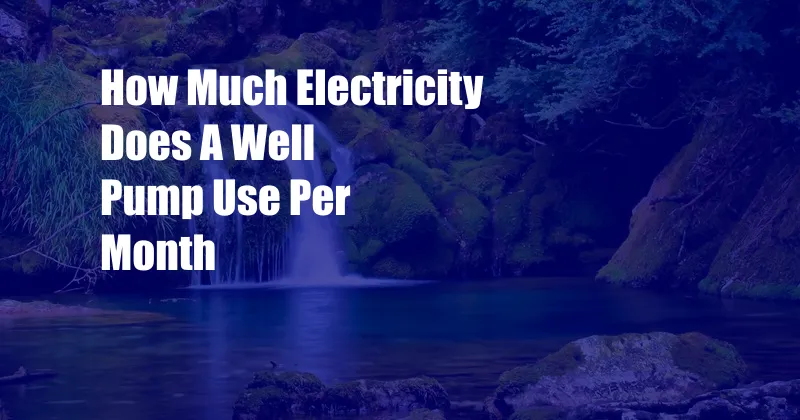
How Much Electricity Does a Well Pump Use per Month?
As a homeowner who relies on a private well for my water supply, I became curious about how much electricity my well pump consumed each month. Previous conversations with neighbors hinted at substantial energy usage, but I was determined to measure the actual consumption for myself.
I installed a kilowatt-hour meter on my well pump and diligently monitored the readings over a period of several months. The results were surprising and provided valuable insights into the operation of my well system.
Understanding Well Pump Electricity Consumption
The amount of electricity a well pump uses depends on several factors, including the depth of the well, the pump’s horsepower, the frequency of usage, and the efficiency of the pump.
The depth of the well determines the amount of work the pump must do to lift water to the surface. A deeper well requires more energy to operate the pump.
The pump’s horsepower is another critical factor. Higher horsepower pumps can move more water faster but consume more electricity.
The frequency of usage also affects electricity consumption. A well pump that runs for longer periods or more frequently will use more electricity than one that operates less often.
Finally, the efficiency of the pump plays a significant role. More efficient pumps use less energy to move the same amount of water.
How Much Electricity Does My Well Pump Use?
My well is 150 feet deep, and I use a 1-horsepower submersible pump. I monitored the electricity consumption for three consecutive months and found that my well pump used an average of 150 kilowatt-hours per month.
This translates to approximately $15 per month based on my current electricity rate. However, it’s important to note that electricity rates vary, so the actual cost may differ depending on your location.
Tips for Reducing Well Pump Electricity Consumption
There are several ways to reduce the electricity consumption of your well pump:
- Install a variable speed pump: Variable speed pumps adjust their speed based on water demand, saving energy when less water is needed.
- Use a timer: Setting a timer to run your pump only during peak usage times can reduce unnecessary energy consumption.
- Insulate your pipes: Insulating the pipes connected to your pump can prevent heat loss and reduce the amount of energy needed to pump water.
- Check for leaks: Leaks in the plumbing system can cause the pump to run more frequently, wasting energy.
Conclusion
Understanding how much electricity your well pump uses is essential for managing your energy consumption. By monitoring your usage and implementing energy-saving strategies, you can reduce the cost of operating your well system without sacrificing water availability.
Are you interested in learning more about well pump electricity consumption or have any questions about the information provided in this article? Leave a comment below, and I’ll be happy to assist you.
Frequently Asked Questions
- Q: How can I measure the electricity consumption of my well pump?
A: You can install a kilowatt-hour meter on your pump to monitor the energy usage. - Q: What are the factors that affect well pump electricity consumption?
A: The well depth, pump horsepower, frequency of usage, and pump efficiency are all important factors. - Q: What is the average cost to run a well pump?
A: The cost depends on the electricity rate in your area and the specific characteristics of your well and pump. - Q: How can I reduce my well pump electricity consumption?
A: Installing a variable speed pump, using a timer, insulating pipes, and checking for leaks are some ways to save energy.